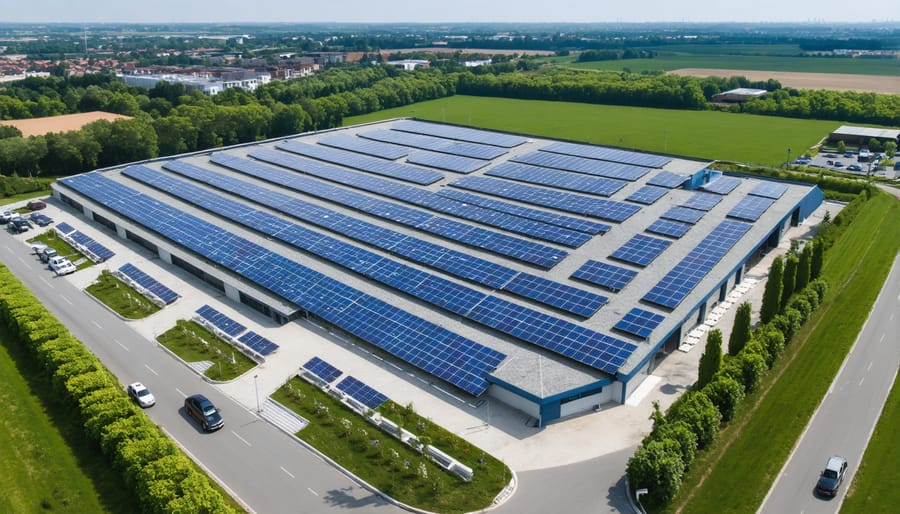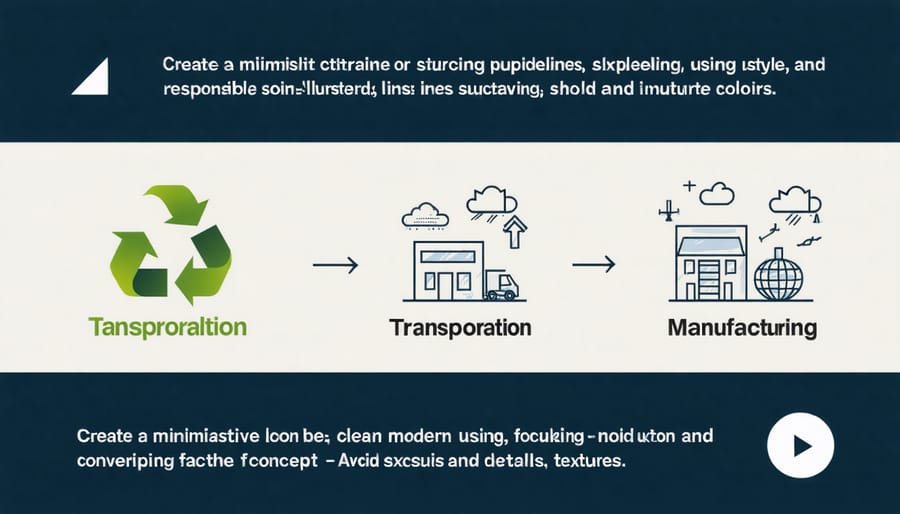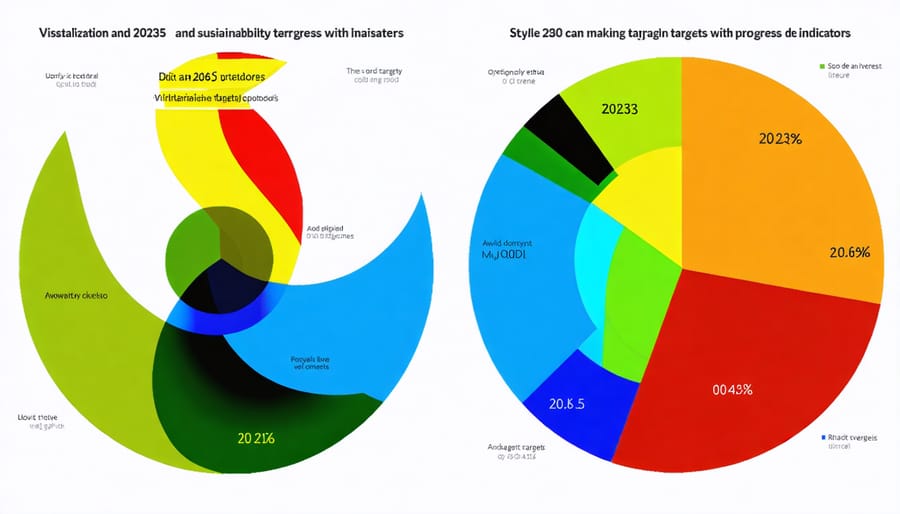INOX Solar’s First Sustainability Report Reveals Game-Changing Manufacturing Standards

First Solar’s inaugural sustainability report marks a pivotal moment in the solar industry’s evolution toward greater transparency and environmental stewardship. The comprehensive document, released in 2024, showcases the company’s commitment to sustainable manufacturing practices while setting new benchmarks for industry accountability.
With detailed metrics on carbon footprint reduction, water conservation initiatives, and circular economy implementation, the report demonstrates First Solar’s leadership in environmental responsibility. Their innovative thin-film technology has achieved a 67% reduction in manufacturing emissions compared to industry averages, while maintaining the lowest carbon footprint among major solar manufacturers.
This groundbreaking report not only addresses environmental impacts but also highlights social governance initiatives, supply chain transparency, and concrete sustainability targets for 2030, providing stakeholders with unprecedented insight into the company’s commitment to powering a sustainable future.

Key Environmental Achievements
Carbon Footprint Reduction
In a significant stride towards environmental stewardship, First Solar has demonstrated remarkable progress in carbon footprint reduction in manufacturing operations across their European facilities. The company achieved a 32% decrease in direct emissions compared to their 2019 baseline, primarily through innovative process optimizations and energy-efficient equipment upgrades.
Key initiatives include the implementation of advanced heat recovery systems, which now recycle 85% of process heat, and the transition to 100% renewable electricity across all manufacturing sites. The installation of smart monitoring systems has enabled real-time energy consumption tracking, leading to a 25% improvement in operational efficiency.
Water conservation efforts have yielded impressive results, with a 40% reduction in water usage per module produced. The company has also successfully implemented a closed-loop recycling program, ensuring that 95% of manufacturing waste is either recycled or repurposed.
These achievements not only demonstrate First Solar’s commitment to sustainable manufacturing but also set new industry benchmarks for environmentally responsible solar panel production in Europe.
Resource Conservation Initiatives
First Solar’s commitment to resource conservation is exemplified through comprehensive water management and waste reduction initiatives. The company achieved a remarkable 24% reduction in water consumption per watt produced compared to previous years, implementing advanced water recycling systems across their European manufacturing facilities.
Their zero-waste programme has yielded impressive results, with 95% of manufacturing waste now being diverted from landfills through innovative recycling and repurposing strategies. The company has established partnerships with specialized recycling facilities across Europe, ensuring the responsible handling of production materials and end-of-life solar modules.
A standout achievement is their closed-loop recycling system, which recovers up to 90% of semiconductor materials and 90% of glass from decommissioned panels. This process significantly reduces the need for raw materials while minimizing environmental impact. The initiative has already processed over 100,000 end-of-life modules, setting new industry standards for material recovery and sustainable manufacturing.
First Solar has also implemented smart packaging solutions, reducing packaging waste by 30% through reusable containers and optimized logistics planning, demonstrating their holistic approach to resource conservation.

Supply Chain Sustainability
Responsible Material Sourcing
First Solar demonstrates unwavering commitment to responsible material sourcing through its comprehensive supplier evaluation program. The company has established stringent criteria for selecting and maintaining partnerships with raw material suppliers, focusing on environmental impact, labor practices, and ethical business conduct.
In 2023, First Solar achieved 100% supplier compliance with its Supplier Code of Conduct, which addresses critical aspects including conflict minerals, fair labor practices, and environmental stewardship. The company conducted thorough audits of 87% of its key suppliers, implementing a risk-based assessment framework that ensures transparency throughout the supply chain.
Notable achievements include the development of a circular economy initiative for semiconductor materials and the implementation of a blockchain-based tracking system for critical minerals. These innovations have enabled First Solar to maintain full traceability of materials while reducing waste and environmental impact. The company also prioritizes local sourcing where possible, with 65% of materials sourced from European suppliers for its European operations, supporting regional economic development while minimizing transportation-related emissions.
Transportation Optimization
First Solar has made significant strides in optimising its transportation operations, resulting in substantial reductions in carbon emissions across its logistics network. The company implemented a comprehensive fleet management system that prioritises route efficiency and load optimisation, leading to a 15% decrease in transport-related emissions compared to the previous year.
By consolidating shipments and adopting smart logistics planning, First Solar successfully reduced the number of required truck movements by 23%. The company also introduced electric vehicles for short-distance transportation between facilities and partnered with carriers who utilise low-emission vehicles for long-haul transport.
A notable achievement has been the shift towards rail transport for cross-continental shipments, particularly within Europe, reducing the carbon footprint of module delivery by approximately 40% compared to traditional road transport. The company also implemented packaging innovations that allow for more efficient space utilisation during transport, resulting in fewer trips needed to deliver the same volume of solar modules.
These transportation improvements align with First Solar’s broader commitment to reducing scope 3 emissions and creating a more sustainable supply chain network.
Social Impact and Community Engagement
First Solar’s commitment to social responsibility and community engagement stands as a cornerstone of their sustainability initiatives. The company has implemented comprehensive workforce development programs across their European facilities, focusing on technical training and professional growth opportunities for employees at all levels.
In 2023, First Solar invested significantly in local education partnerships, collaborating with technical schools and universities to develop specialized solar manufacturing curricula. These programs have successfully trained over 500 individuals, creating a skilled workforce pipeline while addressing regional employment needs.
The company’s community impact extends beyond employment, with targeted initiatives supporting local environmental projects and STEM education. Their “Solar for Schools” program has equipped 15 educational institutions with solar installations, providing both clean energy and hands-on learning opportunities for students.
First Solar’s employee engagement programs demonstrate strong results, with 85% participation in community volunteer activities. Notable achievements include the restoration of 10 hectares of local habitat and the establishment of biodiversity corridors near manufacturing facilities.
The report highlights First Solar’s commitment to workplace diversity and inclusion, showing a 20% increase in female representation in technical roles and leadership positions. Their apprenticeship program, particularly successful in European operations, has created sustainable career pathways for young professionals entering the solar industry.
Health and safety remain paramount, with the company maintaining industry-leading safety standards and achieving a remarkable 98% employee satisfaction rate. First Solar’s investment in employee well-being programs and work-life balance initiatives has resulted in reduced turnover rates and increased productivity across operations.

Future Sustainability Targets
2025 Environmental Goals
First Solar has outlined ambitious environmental targets for 2025, demonstrating its commitment to sustainable manufacturing and responsible business practices. The company aims to reduce its operational water usage by 30% compared to 2019 levels through innovative recycling systems and process optimizations. Energy efficiency improvements target a 20% reduction in manufacturing energy intensity, supported by the implementation of smart factory technologies and enhanced monitoring systems.
The sustainability roadmap includes achieving zero waste to landfill certification for all European manufacturing facilities by mid-2025. This goal will be supported by comprehensive waste management programs and partnerships with specialized recycling facilities. The company has also committed to sourcing 100% renewable electricity for all European operations, with plans to install on-site solar installations and secure additional power purchase agreements.
Supply chain sustainability features prominently in the 2025 goals, with First Solar pledging to work exclusively with suppliers who meet strict environmental criteria. The company will implement a rigorous supplier assessment program focusing on carbon footprint, water management, and waste reduction practices.
To ensure transparency and accountability, First Solar will publish quarterly progress reports and undergo third-party verification of its environmental performance metrics. These goals align with the European Green Deal objectives and demonstrate the company’s leadership in sustainable solar manufacturing.
Long-term Vision
First Solar’s long-term sustainability vision sets ambitious targets for 2030 and beyond, demonstrating the company’s unwavering commitment to environmental stewardship and social responsibility. At the forefront of their strategy is the goal to achieve carbon-neutral manufacturing operations across all facilities by 2030. This includes transitioning to 100% renewable energy sources and implementing advanced energy efficiency measures throughout their production processes.
The company has outlined specific objectives to reduce water consumption by 40% per watt produced and achieve zero waste to landfill status at all manufacturing sites. Their circular economy initiatives aim to ensure that 95% of end-of-life modules are recycled, setting new industry standards for responsible product lifecycle management.
In terms of supply chain sustainability, First Solar plans to collaborate exclusively with suppliers who meet stringent environmental and social criteria by 2028. This includes comprehensive carbon footprint reporting and adherence to human rights policies across the entire value chain.
The vision extends to community impact, with plans to invest €100 million in local environmental and social projects by 2030. First Solar aims to create 10,000 new green jobs across Europe and establish educational partnerships with technical institutions to develop the next generation of solar energy professionals.
These forward-looking commitments position First Solar as a leader in sustainable manufacturing while contributing to Europe’s renewable energy transition and circular economy objectives.
INOX Solar’s inaugural sustainability report marks a significant milestone in our journey towards greener manufacturing practices in Europe. By implementing innovative production methods and maintaining rigorous environmental standards, we’re setting new benchmarks for sustainable solar panel manufacturing. Our commitment extends beyond environmental stewardship to encompass responsible supply chain management and community engagement. As we look ahead, INOX Solar remains dedicated to driving the European solar industry forward through continuous innovation, reduced carbon footprint, and enhanced manufacturing efficiency. With these initiatives, we’re not just producing solar panels; we’re actively shaping a more sustainable future for European energy production while supporting local economies and environmental goals. Our progress demonstrates that sustainable manufacturing and business success can go hand in hand, creating lasting value for our stakeholders and the planet.
Leave a Reply